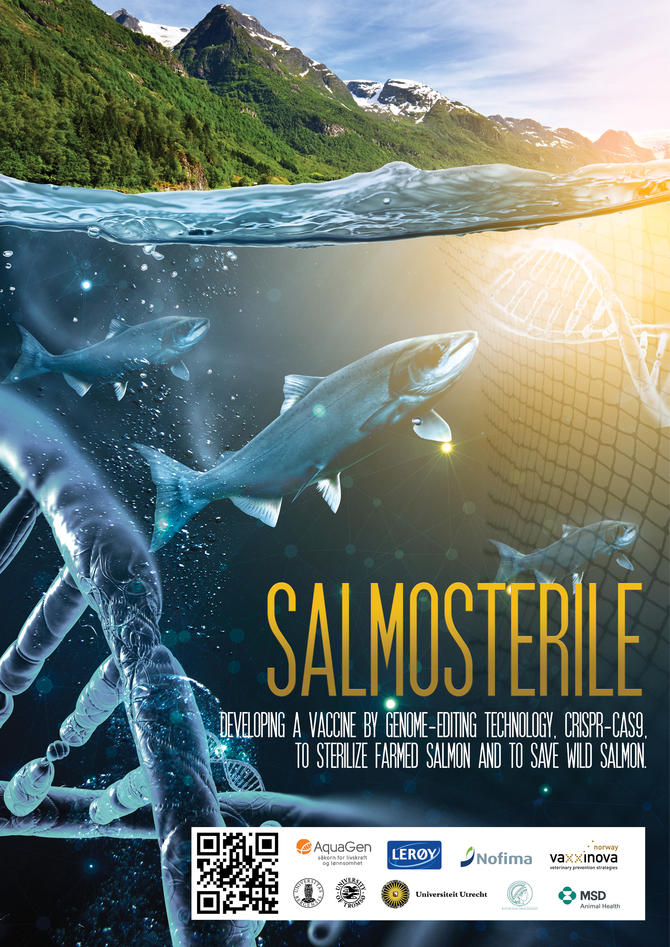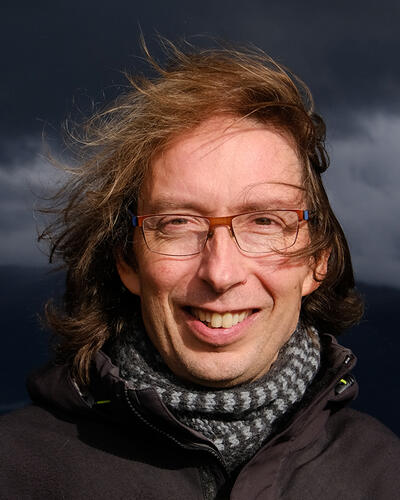Salmosterile
Forskere ved SVT bidrog til ELSA-delen av 'Salmosterile'-prosjektet, som hadde som mål å bruke kunnskapen om laksegenomet til å prøve å lage vaksiner som gjør oppdrettslaks steril.

Hovedinnhold
ELSA står for Etiske, Legale og Sosiale Aspekter ved ny teknologi.
Om prosjektet generelt
Havbruk har utviklet seg til å bli en viktig næring for Norge, og i 2010 ble det produsert mer enn 1 million tonn oppdrettet laks og ørret her i landet. Norge har samtidig gjennom internasjonale avtaler forpliktet seg til å ta et særlig forvalteransvar for villaksen. I forskningsmiljøene er det konsensus om at høy og vedvarende innkrysning av rømt oppdrettslaks er negativt for den ville laksen. Mengden rømt laks er blitt betydelig redusert de siste årene, men siden antallet fisk per enhet i oppdrett vanligvis er svært høyt, kan selv enkelthendelser i forbindelse med rømming få store konsekvenser. Dersom målet er å sikre at havbruk ikke bidrar til varige endringer i de genetiske egenskapene til villfiskbestandene, må en i fremtiden basere seg på produksjon av steril oppdrettslaks.
I de seinere år har en undersøkt mulighetene for å produsere triploid steril laks. Denne metodikken er allerede tatt i bruk i regnbueørretoppdrett i Europa og i lakseproduksjon i Tasmania. Imidlertid er det kjent at den triploide laksen vil være noe mer utsatt for beindeformiteter og reduserte oksygennivåer ved høye sjøtemperaturer. I tillegg vil den triploide hannfisken utvikle kjønnsdrakt og vandringsadferd, slik at den trolig kan forstyrre gytingen i elvene selv om den ikke kan parre seg med villaksen. Derfor er det aktuelt å utvikle alternative og bedre måter for å gjøre laksen steril. Sekvenseringen av laksegenomet vil gi oss informasjon om mange av genene som regulerer dannelsen av kjønnsorganene hos lakseembryoet, og som styrer kjønnsmodning hos større fisk. Dette åpner mange mulige tilnærminger for å utvikle alternative og mer spesifikke metoder for å produsere steril fisk. Vi har derfor søkt og fått innvilget et stort prosjekt fra Forskningsrådets bioteknologiprogram BIOTEK2021, der vi skal bruke kunnskapen om laksegenomet til å prøve å lage vaksiner som gjør oppdrettslaks steril. Prosjektet har fått tittelen: "SALMOSTERILE: Sterile salmon by targeting factors involved in germ cell survival: novel vaccination strategies for sustainable fish farming”.
SVTs bidrag (ELSA)
Forskere fra SVT bidrog spesifikt til ELSA-delen av prosjektet i WP5.
Ressurser:
Se Dorothy Dankel's presentasjon "A critical look at science-industry partnerships in Norwegian salmon farming: What's in in for Society?" her.
Aktiviteter 2016
- Januar 2016: The ELSA team held a workshop “Techno-moral imaginaries of the Salmosterile project” at the Centre for the Study of the Sciences and the Humanities at the University of Bergen
- Mai 2016: Dorothy Dankel was invited by Prof. Jennifer Bailey to speak on biotechnology and aquaculture at Oceans Week at NTNU in Trondheim. A critical look at science-industry partnerships in Norwegian salmon farming: What's in it for society?
- 18.-19. Mai 2016: Dorothy Dankel co-organized a workshop on “Multi-Use of Marine Spaces” at the European Maritime Day in Turku, Finland.
- Mai 2016: Dorothy Dankel traveled to South Korea on a Meltzer (UiB fund) travel grant for the World Fisheries Congress and presented her research “Doing CRISPR: the novel case of Atlantic salmon, science and industry” in Theme Session “Aquaculture in the Future and Beyond.
- Juni 2016: Dorothy Dankel was invited to give the opening Keynote Address at the University of Nantes OCEANEXT conference June 8-10, 2016. Transdisciplinary Insights into Integrated Ecosystem Assessments. Tweets can be found at #oceanext.
- 19. August 2016: Jeroen van der Sluijs gave a 45 minutes invited lecture "Risks and ethics of the novel genome editing technology CRISPR" at the international Koppelting 2016 conference at the Cooperative University of Amersfoort (a grass-roots citizen science initiative).
- 24. August 2016: Jeroen van der Sluijs gave a 1.5 hour invited lecture "Responsible Evidence Appraisal" at the 2016 Bergen Exchanges on Law and Social Transformation, using CRISPR as an illustrative case.
- Oktober 2016: Dorothy Dankel working on writing proposals REFERTILE and SEAGENE incorporating a transdisciplinary approach and Responsible Research and Innovation activities.
- 12.-14. Oktober 2016: S.NET International Conference, Bergen, Norway
- CRISPR salmon Topical Session and discussion called “Doing CRISPR”: Genetically modified Norwegian farmed salmon: in the lab or on the plate?
- Dorothy Dankel from the University of Bergen and Lene Kleppe from the Institute of Marine Research and the Salmosterile project first presented ethnographical and embedded insights from within the CRISPR lab. Then Dorothy led a debate and which led into a conversation with the audience on the future of GM salmon: “in the lab or on the plate?” Mathias Kaiser, Director of the Centre for the Study of the Sciences and the Humanties (UiB), Fer Wickson, GenØk (Tromsø) and Silvio Funtowicz (UiB) were among those who actively participated in the discussion.
- Presentation by Jeroen van der Sluijs on "The challenges of risk migration in sustainable innovation", addressing the questions (1) To what extend does the development and introduction of sustainable consumer products introduce novel unforeseen risks?; (2) Under what conditions does that occur? and (3) What are promising strategies for detection and avoidance of such risks early in the innovation trajectory?
- 26. Oktober 2016: Dorothy Dankel participated in the ForskerForbundet’s Pecha Kucha night on climate change and marine resource management
- 22.-23. November 2016: Course in Transdisciplinary Research Co-Design, Swedish Royal Academy of Sciences, Stockholm (hosted by Future Earth, and travel grant from Future Earth Norway).
On-going activities:
Dorothy Dankel will deliver her manuscript “Doing CRISPR” to the consortium in early December 2016 for internal review. After this internal review, she will submit to a journal for a peer-review.
Dorothy Dankel also remains dedicated to discussing the Salmosterile project and the potential of spin-offs with Anna Wargelius. One result of this ELSA work package has been the design and formulation of Responsible Research and Innovation activities.

